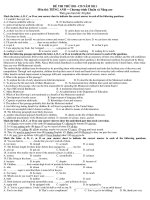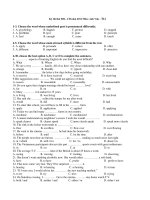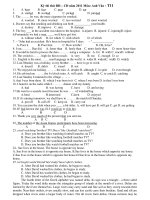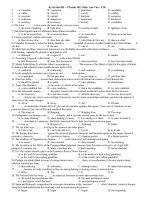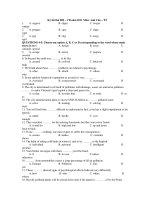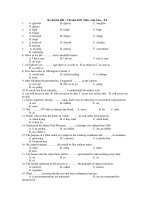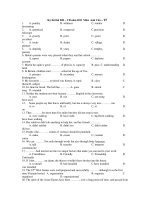ĐỀ THI THỬ ĐH - CĐ NĂM 2011 Môn thi: TIẾNG ANH pot
Bạn đang xem bản rút gọn của tài liệu. Xem và tải ngay bản đầy đủ của tài liệu tại đây (104.83 KB, 2 trang )
1
ĐỀ THI THỬ ĐH - CĐ NĂM 2011
Môn thi: TIẾNG ANH ─ Chương trình Chuẩn và Nâng cao
Thời gian làm bài: 60 phút
Mark the letter A, B, C, or D on your answer sheet to indicate the correct answer to each of the following questions.
1. I wouldn’t have got wet …………
A. if I had an umbrella with me B. if I had had an umbrella with me
C. unless I had had an umbrella with me D. in case I had am umbrella with me
2. The students liked that professor’s course ………….
A. as there was few or no homework B. unless there was not a lot of homework
C. even though there were a great number of homeworks D. because there was little or no homework
3. The faster we finish, ……
A. the sooner we can leave B. we can leave sooner and sooner C. the sooner can we leave D. we can leave the sooner
4. I’ll post the card today ………. there on my mother’s birthday.
A. to get it B. in order to get it C. so as it gets D. so that it gets
5. I was enjoying my book, but I stopped ……………a program on TV.
A. reading to watch B. to read to watch C. to read for watching D. reading for to watch
Read the following passage and mark the letter A, B, C, or D on to indicate the correct answer to each of the questions.
Most educational specialists believe that early schooling should provide children with an awareness of their own abilities and the self-confidence
to use their abilities. One approach recognized by many experts as promoting these qualities is the Montessori method, first practiced by Maria
Montessori of Italy in the early 1900s. Nancy McCormick Rambusch is credited with popularizing the method in the United States, where today
there are over 400 Montessori schools.
The method helps children learn for themselves by providing them with instructional materials and tasks that facilitate acts of discovery and
manipulation. Through such exploration, children develop their sense of touch and learn how to do everyday tasks without adult assistance.
Other benefits include improvement in language skills,and acquaintance with elements of science, music, and art.
6. What is the purpose of this passage?
A. To explain the role of early education in child development. B. To describe the development of the Montessori method.
C. To discuss the life and work of Maria Montessori. D. To demonstrate how children lean social and cultural values.
7.According to the passage, who was the first responsible for spreading the Montessori method in the United States?
A. Nacy McCormick Rambusch. B. A prominent educational expert.
C. Maria Montessori. D. An administrator in the Department of Education.
8. Which of the following is not mentioned as a benefit of the Montessori method?
A. Development of tactile senses. B. Improvement of language ability.
C. Capacity to perform adult tasks. D. Knowledge of arts and sciences.
9. The author of this passage probably feels that the Motessori method
A. has little long-lasting benefit for children. B. will lose its popularity in The United States.
C. does not accomplish what it claims to achieve. D. is an effective means of child education.
10. The following paragraph most likely discusses
A. another educational approach beneficial to children. B. details on the life of Maria Motessori.
C. additional practitioners of the Montessori method. D. elements of science, music, and art.
Mark the letter A, B, C, or D on your answer sheet to show the underlined part that needs correction.
11. (A) Nearly every region of the earth (B) must has been (C) affected by human (D) activity.
12. It (A) was raining quite (B) heavy (C) so we stayed at home (D) all day.
13. Instead of (A) calling (B) off the meeting, maybe we can just (C) put it (D) over until next month.
14. They (A) need to spend more time (B) learning English, (C) Maths, and (D) Physical so they can pass the exam.
15. I (A) won’t give up before I (B) will (C) have finished what I (D) set out to do.
Mark the letter A, B, C, or D on your answer sheet to indicate the correct answer to each of the following questions.
16. You can borrow………… books that you can’t read all of them.
A. too many B. enough C. so much D. so many
17. The firemen fought for three hours before they managed to………. the fire.
A. give up B. put out C. break off D. cut back
18. A person who studies one or more of the natural sciences is called a……….
A. science B. scientist C. scientifically D. sciences
19. I like living in the dorm ……… its noise.
A. because B. in spite C. despite D. because of
20. Children ………….diets contain high levels of protein do better in examination.
A. who B. whom C. that D. whose
21. ………….sugar is used that there is none left in the pot.
A. Too many B. So many C. So few D. So much
22. Which one do you want? I don’t want
A. both B. neither C. either D. each
23. Both domestic and imported automobiles must……………anti-pollution devices.
A. equip with B. be equipped with C. equip by D. be equipped by
24. A: You’re a great dancer. I wish I could do half as well as you. B: …………………………. I’m an awful dancer!
A. You’re too kind. B. That’s a nice compliment! C. You’ve got to be kidding! D. Oh, thank you very
2
much.
25. People usually use more……… language when they’re in serious situations like interviews.
A. formal B. informal C. serious D. solemn
26. I think some ………….species that need protection.
A. danger B. dangerous C. endanger D. endangered
27. Le: “So, how is your teacher?” Nam: “ …….”
A. He doesn’t like French B. I met her last year C. She’s very strict D. He teaches us English
28. She worked hard……………everything would be ready in time.
A. since B. as if C. unless D. so that
29. If I had much spare time, I …………around the world.
A. would travel B. would have traveled C. had travel D. will travel
30. “How often do you go to school ?” “…………………”
A. I go there early B. Every day except Sunday C. I do not think so D. I go there by bus
31. “………. eating out tonight? ” _ “ That’s a good idea.”
A. Would you B. How about C. How are you D. Are they
32. They ……….here for three years before they moved to Bristol.
A. live B. have lived C. had lived D. have been living
33. A: “What a beautiful dress! I like it” – B:“…………………………… ”
A. Don’t mention it B. Your welcome C. It’s nice of you to say so D.I feel happy to hear that
34. It is late, so we ………… hurry up in order not to miss the meeting.
A. had better B. need C. can D. dare
35. Let the boy …………. it himself before you offer to help.
A. try B. to try C. trying D. will try
36. By the time he went back to work in his country, he ………his course on Advanced Engineering in London.
A. finishes B. has finished C. had finished D. was finishing
37. ”I have passed all my examinations!” “…………”
A. My dear! B. Best wishes! C. Well done! D. That’s very well!
38. The doctor is believed …………a lot of people’s lives in the past.
A. save B. saving C. to save D. to have saved
39. You go on ahead and then I’ll catch ………… you.
A. along with B. forward to C. up with D. on to
40. ‘What did your grammar teacher want to talk to you about?’ – ‘I did badly on the last test. She …….studied for it.
A. said why hadn’t I B. said why I hadn’t C. asked why hadn’t I D. asked why I hadn’t
Mark the word whose underlined part is pronounced differently from that of the rest.
41. A. leaves B. songs C. deserts D. goes
42. A. economy B. competition C. develop D. job
43. A. town B. account C. slowly D. cow
44. A. weighed B. laughed C. matched D. missed
45. A. vision B. division C. measure D. listen
Read the following passage and mark the letter A, B, C, or D to indicate the correct word for each of the blanks.
A good deal of fascinating research has been done about the reading patterns of young people, and it is surprising to discover ……(46) …….
what an early age children start expressing preferences for particular kinds of books. A recent report, which examined in detail the reading
… (47)……… of primary-school children, showed that even seven-year-old boys and girls have clear views about what they want to read. Girls,
in general, read more, and far more girls than boys ….(48) …… reading stories. Boys were showing a taste for the more instant appeal of
picture stories, or else books about their hobbies.
These tastes continue unchanged until the children are teenagers. Apparently girls read more in general, but more fiction in particular. You could
say that there are a lot …………(49)……… opportunities for girls to read fiction: magazines encourage the fiction habit in girls in their early
teens, and by their late teens they have probably moved on to the adult women’s magazines. Teenage boys tend to buy magazines about their
hobbies: motorcycles, ……(50) ……… transport and so on.
46. A. at B. on C. in D. from
47. A. talent B. habits C. age D. time
48. A. hated B. knew C. showed D. preferred
49. A. much B. a great deal of C. little D. few
50. A. weight B. heavy C. difficult D. small
THE END GOOD LUCK!
ANSWER KEYS:
1. B 2. D 3. A 4. D 5. A 6. B 7. A 8. C 9. D 10. A
11. B 12. B 13. D 14. D 15. B 16. D 17. B 18. B 19. C 20. A
21. D 22. C 23. C 24. C 25. A 26. D 27. C 28. D 29. D 30. B
31. B 32. C 33. C 34. A 35. A 36. C 37. C 38. D 39. C 40. D
41. C 42. C 43. C 44. A 45. D 46. A 47. B 48. D 49. D 50. B
